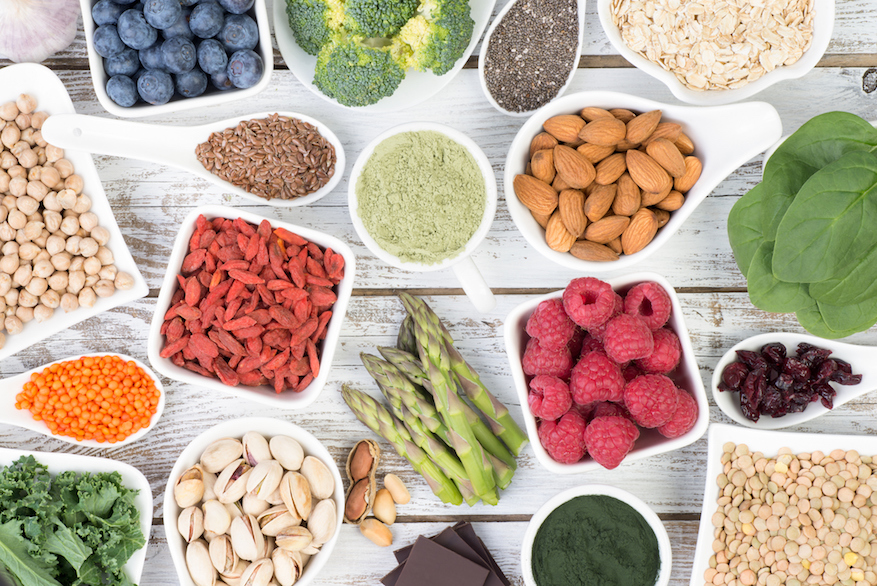
Healthy food called super foods on white, wooden background, top view
By Richard Cunningham, MD, Board Certified Orthopedic Surgeon
Studies show osteoarthritis is the most frequent cause of physical disability among older adults, affecting more than 20 million Americans. In osteoarthritis, there is a gradual loss of the coating or articular cartilage in our joints.
Although there is a mechanical wear and tear component (such as obesity and meniscus tears), it is now known that osteoarthritis is an active joint disease with a prominent inflammatory component. If the loss of cartilage is caused by inflammation, then the question comes up as to what is the best diet to fight this inflammation or what supplements might one take to counter the inflammation?
Dr. Campbell’s China Study and other scientific studies by doctors Esselsyn, McDougall and Ornish have demonstrated that pro inflammatory foods consist of meat, dairy, fat, refined grains and sugar. These foods make up the Standard American Diet and are the primary reason for the health care crisis in this country.
A diet primarily composed of animal products contributes to low grade systemic inflammation and oxidative tissue stress, placing the immune system in an oxidative state. Osteoarthritis is an oxidative process. It has been shown that there are significantly higher inflammatory prosteoglandins in tissue samples of people with OA.
It has been scientifically proven that countries that eat more animal products (such as meat and dairy) have higher rates of rheumatoid arthritis, a chronic systemic inflammatory disorder that causes progressive destruction of the joints. Researchers have shown that the body forms immune complexes that attack animal proteins, and it is thought that this may promote autoimmune reactions in one’s joints, leading to joint destruction. In fact, when patients stopped ingesting animal products, there was a decrease in rheumatoid arthritis attacks. Those with rheumatoid arthritis have elevations in antibodies to foods like fish, pork, egg whites, dairy proteins and even some cereals.
Reduce Animal Consumption
There was a recent 13-month-long randomized controlled trial (the best type of scientific trial there is) of plant-based diets for the treatment of rheumatoid arthritis. Patients were put on a vegan diet for three and a half months and then switched to an egg-free vegetarian diet for the remainder of the study. Compared to the control group, who did not change their diet, the plant based group had much less joint stiffness especially in the mornings, and there was a decrease in pain and disability measures. Inflammatory markers in their blood (such as CRP and ESR) dropped considerably.
For my patients suffering from osteoarthritis or rheumatoid arthritis or for those hoping to avoid these conditions, I recommend eating a whole-food, plant-based diet. An anti-inflammatory diet consists of vegetables, fruit, whole grains and legumes. There are phytonutrients in plants that help decrease the degradation of cartilage in our joints by acting as potent anti-oxidants.
For many, including myself, it is difficult to decrease or eliminate the consumption of animal products all at once. That is OK. First try to cut down on the consumption of meat and sugar and increasing your consumption of fruit and vegetables and whole grains (no refined wheat products). Cow’s milk and cheese is particularly inflammatory so try to substitute a non-dairy milk (such as soy, almond, rice milk). Your arthritic joints will thank you.
Try Tumeric
As for supplements to help the symptoms of arthritis, I would recommend taking tumeric. Tumeric has a curcuminoid compound that acts as an anti-inflammatory. Orthopedic researchers have shown decreased serum markers of inflammation (such as IL-1 and IL-6 and ESR) in patients taking a curcumin supplement.
In one study of patients with knee arthritis, those taking curcumin were able to double their walking distance. They were also able to decrease their drug use and had less knee swelling. In another study, 107 patients with knee osteoarthritis were randomized to ibuprofen or turmeric supplements for six weeks and the supplement group did as well as those on ibuprofen. Moreover, curcumin does not have the potential gastrointestinal side effects that ibuprofen has.
